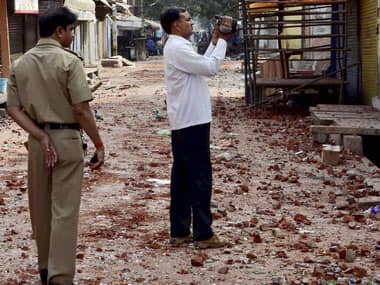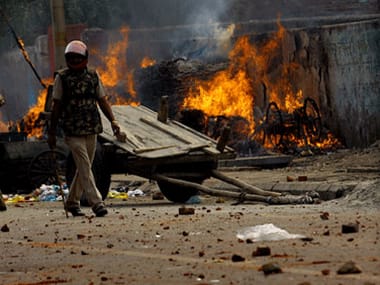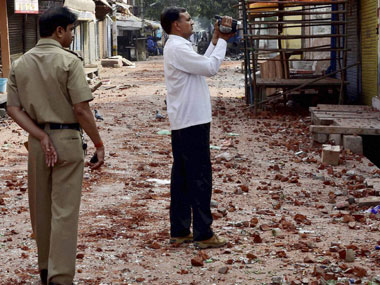New Delhi: The communal violence in East Delhi’s Trilokpuri may have disappeared from media headlines, but it has caused changes in the political equations here which are going to last. Unlike earlier, residents of this slum resettlement colony, especially the youth, have started identifying with their community more. There’s a hint of polarisation but people are not sure whether it is going to work for any political party. The candidates put up by parties are too weak to openly stand by their caste and communal identities, they feel. [caption id=“attachment_2067891” align=“alignleft” width=“380”]  The people are likely to vote based on communal lines: PTI[/caption] “We faced bullets and stones to protect Mata Ki Chowki (a makeshift temple) from desecration. With iron hands we dealt with those who tried to play with our religious sentiments. Our youth were arrested, tortured and put behind bars. But unfortunately, our political leaders abandoned us for their electoral gains,” Tilak Raj Tanwar, a resident of Block 20, told Firstpost, adding that “votes will be cast in the upcoming polls in favour of the candidate who will stand with us and protest our religious identities”. Asked about candidates who are in the fray from the constituency, most of the residents said no one meets their expectations. “Our leader Sunil Vaidya (a BJP leader and former MLA) is no more. His wife (Kiran Vaidya) is contesting on the BJP ticket, but we cannot support her as she is a weak candidate because she is a house wife and new to politics. Despite being a member of the Valmiki Dalits, incumbent legislature Raju Dhingan (of AAP) did nothing for us. When there was unrest in the area, he preferred to stay at home. The Congress candidate (Brahmpal Singh who has represented the constituency for three terms) is a good candidate, but his party is a sinking boat,” said Rajendra Prasad of Block 23. Predicting a sharp division of Hindu votes, Ved Prakash Chaurasia of the same block, says, “Last year, Dhingan got support from a sizable chunk of Hindus and Muslims but this will not be repeated this year as he did nothing on the ground to woo voters. He is a lazy person and has no hold on the administration. Even the SHO of the local police station does not listen to him. Muslims may favour his candidature, but he is bound to lose votes of his own community.” At the same time, he claims that Dhingan’s loss will not benefit the BJP. “Sunil Vaidya was a seasoned politician but his wife is a dummy candidate. She can win only if she gets sympathy votes because of the sad demise of her husband,” he said. Bahujan Samaj Party (BSP) candidate Dr Girish is also considered to be very much in the contest. Pramod Kumar Singh of Block 21 says, “This year, the BSP has fielded a strong candidate. Dr Girish is a medical doctor and enjoys support of Valmikis and other Dalit communities. The loss of the Dalits’ votes from AAP’s basket may work in his favour. Therefore, it won’t come as a surprise if he wins despite the speculation of a direct fight between the BJP and the AAP.” With a majority Dalit population, Trilokpuri is a reserved constituency. Of over two lakh voters in the constituency, Valmikis constitute 40 percent, other Dalits 20 percent, Muslims 20 percent and rest 20 percent. The Valmiki blocks 1 to 36 in Trilokpuri make up the majority of the constituency, which includes parts of Kalyanpuri. Each block contains 500 houses, several of which are one-room tenements lined on either side of narrow alleyways. Muslim families live in blocks 15, 20, 27, with some families residing in Block 32 and Block 36, the majority being Hindu households. The sectarian violence in October last year is likely to cause consolidation of Muslim votes, which in a way could be a deciding factor. “Given the circumstance, we are left with no option but to go with the AAP. We want to give Arvind Kejriwal a chance in the hope that he will do something for the common man. As the Congress is nowhere in the fight, there is no point of wasting votes,” a young voter MD Jawed of Block 15 said. [caption id=“attachment_2067901” align=“alignleft” width=“380”]  The riots have created a massive trust deficit[/caption] Israr Khan, whose garment shop in Block 27 was turned into ashes in the riots, says, “The instability caused by the communal conflagration has impacted everyone, especially poor. Therefore, we want a government that can promote peace and harmony. Kejriwal should be given a chance to prove himself.” But as usual, some feel, that there may be a division of Muslim votes. “The consolidation of Muslim votes in favour of AAP is not possible. Muslims have been in favour of the Congress party since independence,” said Nasiruddin, an elderly resident of Block 23. While the electorate has become polarised, the parties in the fray have been busy talking about “communal harmony, peace and brotherhood”. “It is unfortunate that seeds of communal hatred have been sown and instead of talking about infrastructural development, we are appealing people to maintain peace and communal harmony. No riots took place during my three consecutive terms as the MLA of the constituency. It took only a year for the matter to go out of control, Brahmpal told Firstpost. In an attempt to reach out to Muslims to garner their support, BJP’s Kiran Vaidya is also holding meetings with the community members. When asked about the alleged involvement of her late husband in the violence that resulted in scores of injuries, dozens of arrests and the incineration of a Muslim-owned shop, she said, “The violence was the handiwork of few anti-social elements. Contrary to the allegations, it was my husband who played an important role in restoring peace in the area. Maintaining communal harmony was always on top of his agenda.” “I have the support of my Muslim brothers and sisters. They come to me with their complaints and suggestions. I am duty-bound to take along all communities together,” she added. Maintaining that he has got the additional responsibility of bridging the gap between the two communities, AAP’s Raju Dhingan said, “Previously, I promised low cost electricity to every household, better drainage system, construction of parks and community centres. In addition to highlighting the development works I did in the last one year, I am appealing people to vote for secular parties.” “After the massacre of 1984, Trilokpuri was peaceful. People lived here in harmony and always showed restrains on sensitive occasions. This riot took us by surprise. I have been working with both Hindu and Muslim communities for ending the trust deficit,” he added.
The communal violence in East Delhi’s Trilokpuri may have disappeared from media headlines, but it has caused changes in the political equations here which are going to last.
Advertisement
End of Article


)
)
)
)
)
)
)
)
)



